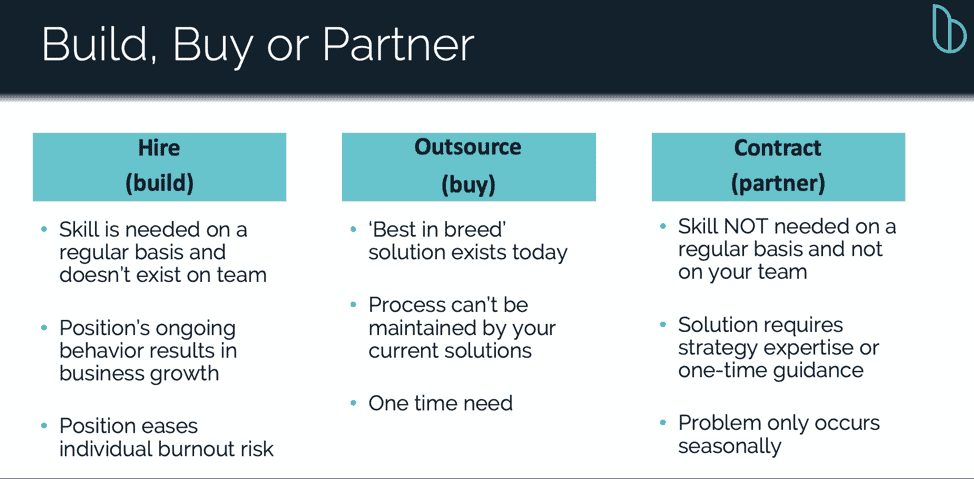The buy, build or partner question comes up all the time when creating a product. In the process of building a solution, the product manager makes an assessment on whether they should solve the problem by building the solution themselves, buying a complimentary solution or partnering with another provider. Interestingly, when considering whether adding to your team solves a scaling problem, you can use the same criteria.
Think about adding a new team member like this:
Build – Should you solve your problem by building onto your team? Hire.
Buy – Should you solve your problem by investing in an existing technology or services solution? Often, solutions can be found in existing technology or a service.
Partner – Should you solve your problem by contracting an expert with proven experience? Engage a contractor.
Here’s a chart to further help you evaluate your options:

Let’s say you choose ‘contract’ to solve the problem. After all, over 20% of businesses do engage with contractors. There’s one more evaluation step that ensures the new contractor will pass the legal sniff test. Contractors are essentially independent entities who do not work exclusively for one person or business and are subject to different law and tax guidelines than employees. So, if you can answer ‘yes’ to any of the next six statements, the role can be filled by a contractor.
- You don’t define the work hours: Generally, independent contractors are only responsible for getting the job done. They should be paid by the project — rarely on an hourly basis.
- You don’t provide equipment or supplies: Independent contractors generally supply their own equipment and supplies. Contractors are, by definition, independent professionals. It makes sense they would have their own printer, laptop or camera.
- The relationship is finite: The longer-term the agreement, the more likely the worker is an employee.
- You will receive invoices: You treat the contractor as a vendor under accounts payable. Make sure you receive invoices, and the payment checks should be written to a business.
- The worker has other professional commitments: Independent contractors typically work with many clients during a given timeframe.
- The worker will not perform core business services: Contractors should provide supplemental services that aren’t an integral part of your business. For example, if you use a contractor to build a website for your baking company, that’s not a core business service. But if your business is designing websites that could be a problem.
As always, there are exceptions. So, before you make a decision, double check with your favorite legal representation.
You’ve officially decided that you need a contractor but with over 15.5 million contractors in the US, how do you find the right one? This is where you are going to have to put in a lot of time. At Boulo, we interview and vet hundreds of talented professionals, and we know that the only way to make the right choice is by doing your due diligence. The time commitment starts by sifting through all the resumes from online job boards, dodging calls from your personal network pitching their best friend, and accepting all those LinkedIn connections. Then you’ll have to schedule live vetting so you know that you and the contractor will be able to communicate well throughout the contract. And finally, while managing the work itself, you’ll have to stay on top of the legal paperwork, timely payments and tax forms.
But don’t throw away the perfect solution to a problem because you lack the time to invest in the process. That’s why platforms like Boulo are so beneficial. Our core competency is finding the perfect individual to solve your problem. We’ll even help you navigate the buy, build or partner decision to make sure you end up exactly where you need to be successful. For icing on the cake, Boulo also handles all the paperwork aspects that come with a contractor like contracts, milestones, invoicing and taxes.

